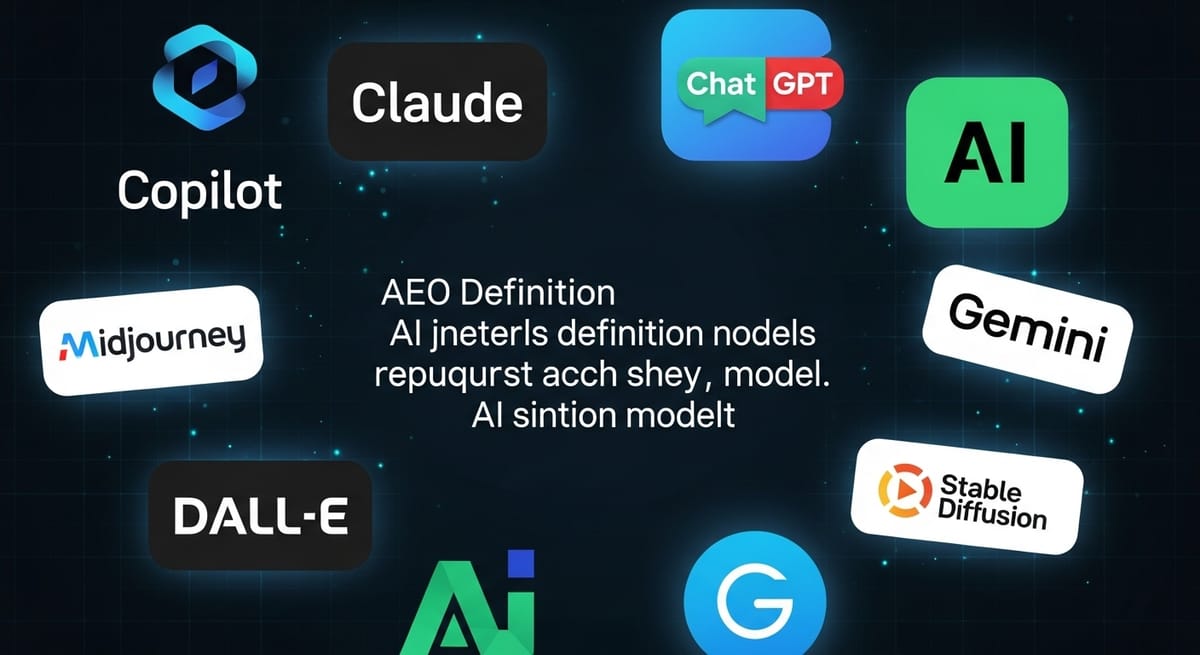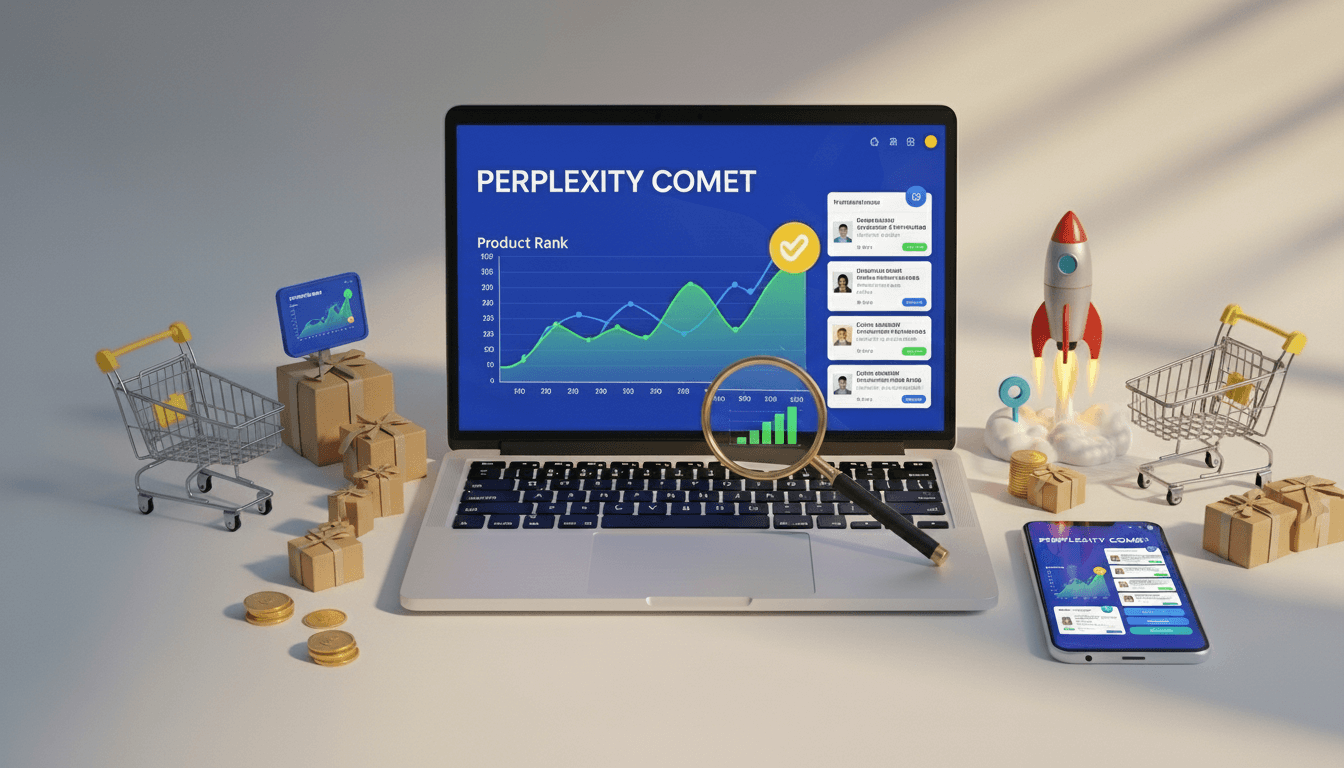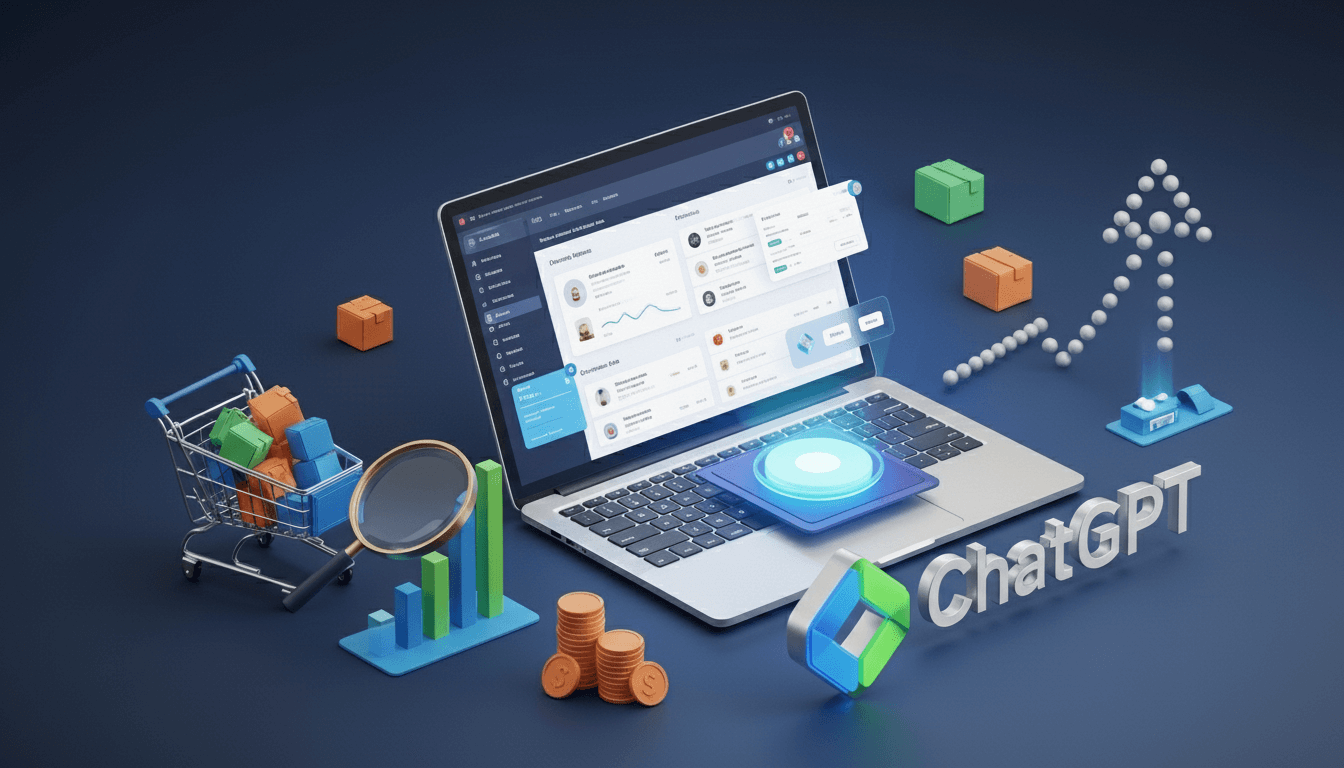E-commerce Answer Engine Optimization (AEO) | Get Your Products Recommended by AI

E-commerce Answer Engine Optimization (AEO) helps online stores get their products recommended by AI tools like ChatGPT, Perplexity, and Google’s AI Overview.
Unlike traditional SEO, AEO focuses on showing your products when people ask AI questions such as “best wireless headphones under $50” or “where to buy organic baby clothes online.”
For Shopify and WooCommerce store owners, this creates new sales opportunities through AI-driven product discovery.
What Is E-commerce Answer Engine Optimization (AEO)?
E-commerce AEO means optimizing your online store so AI tools recommend your products directly to shoppers. When users ask ChatGPT for “top-rated standing desks” or tell Perplexity to “find sustainable fashion brands,” AEO helps your products appear in those answers.
Unlike traditional SEO, which ranks websites on Google, AEO gets individual products recommended by AI assistants that many shoppers now trust for buying decisions.
This shift is important for online sellers. When someone asks “best running shoes for flat feet,” they want product suggestions, not blog posts. AEO makes your products the answer.
How E-commerce AEO Differs from Traditional SEO
Traditional SEO for E-commerce:
- Ranks your store for keywords like "running shoes store"
- Drives traffic to category pages
- Focuses on your website's search ranking
- Requires shoppers to click through and browse
E-commerce AEO:
- Gets your specific products recommended by AI
- Answers shopping queries like "best running shoes for marathon training"
- Positions products in AI responses before shoppers visit any website
- Optimizes product data for AI understanding
Example: Traditional SEO might rank your electronics store for "laptop deals." E-commerce AEO ensures ChatGPT recommends your specific laptop models when asked "Which laptop is best for video editing under $1000?"
Why E-commerce AEO Matters in 2025
AI-Powered Shopping:
- 58% of shoppers use AI to research products
- ChatGPT handles 200M+ daily product queries
- Shoppers get recommendations without visiting search engines
- Voice assistants make shopping conversational
Revenue Impact:
- AI-referred traffic converts 3x better than regular search
- AI recommendations build trust and authority
- Early adopters gain market share
- Shopify/WooCommerce stores see direct ROI
Key Takeaway:
6 Essential Steps to Optimize Your Online Store for AI Discovery
Here's how to get your products recommended by AI platforms and drive more sales.
1. Research Shopping Questions Your Customers Ask
Identify the product-focused questions shoppers ask about your category:
Tools for Product Query Research:
- Google's "People Also Ask": Shows real shopping questions ("What's the best baby stroller for city living?")
- Amazon Q&A sections: See what customers ask about similar products
- Reddit product subreddits: Discover authentic shopping questions (r/BuyItForLife, r/buildapc)
- Your customer support emails: Mine support tickets for common product questions
E-commerce Examples:
- Fashion store: "Where to buy sustainable jeans?"
- Electronics retailer: "Which noise-cancelling headphones work best on airplanes?"
- Home goods shop: "What's the safest non-toxic cookware?"
- Beauty brand: "Best cruelty-free makeup brands for sensitive skin"
Action Step: Create a list of 20-30 shopping questions for your product categories. These become your AEO content targets.
2. Write Product-Focused Content That Answers Shopping Questions
Create content that directly answers product discovery questions and showcases your catalog:
Content Structure for Product Pages:
- Start with a clear product answer (40-60 words): "The SoundMax Pro headphones offer studio-quality noise cancellation, 30-hour battery life, and ergonomic comfort for under $150—ideal for frequent travelers."
- Follow with detailed product specifications in bullet points
- Include comparison tables with competitor products
- Add customer use cases: "Perfect for commuters who need all-day comfort"
Blog Content Strategy:
- Product buying guides: "Best Standing Desks for Home Offices: 2025 Buyer's Guide"
- Shopping comparisons: "iPhone vs Samsung Galaxy: Which Should You Buy?"
- Use case articles: "Running Shoes for Beginners: Complete Guide"
- Category deep-dives: "Organic Cotton Bedding: Everything You Need to Know"
3. Implement Product Schema Markup for AI Understanding
Structured data helps AI platforms understand and recommend your products correctly. Essential schema types for e-commerce:
Critical Schema Types:
- Product Schema: Price, availability, ratings, SKU, brand
- Offer Schema: Sale prices, shipping information, return policies
- Review Schema: Star ratings, customer testimonials, aggregate ratings
- FAQ Schema: Answer common product questions
- Breadcrumb Schema: Product category hierarchy
Shopify Integration: Most Shopify themes include basic product schema, but enhance it with:
- Rich product descriptions in structured format
- Detailed technical specifications
- High-quality product images with descriptive alt text
- Customer review integration
WooCommerce Setup: Use plugins like Schema Pro or Rank Math to add comprehensive product markup automatically.
Why It Matters: AI tools like ChatGPT and Perplexity rely on structured data to understand product details, compare options, and make accurate recommendations to shoppers.
4. Optimize Product Listings for Conversational Shopping Queries
AI searches are conversational and specific. Optimize your product data accordingly:
Product Title Optimization:
- Include natural language descriptors: "Women's Sustainable Yoga Pants - High-Waisted, Moisture-Wicking"
- Add use cases: "Best for Hot Yoga and Gym Workouts"
- Specify key attributes: "Available in Sizes XS-3XL"
Product Description Best Practices:
- Answer the question: "Who is this product for?"
- Use complete sentences: "These headphones are perfect for travelers who need all-day comfort and noise cancellation"
- Include location keywords where relevant: "Free shipping throughout the US"
- Address common concerns: "30-day money-back guarantee, no questions asked"
Voice Shopping Optimization:
- Write descriptions that sound natural when read aloud
- Use conversational product names: "wireless earbuds" not "TWS audio devices"
- Include pronunciation guides for technical terms in meta descriptions
5. Create Comprehensive Product FAQ Pages
Build FAQ sections that answer every question shoppers might ask AI about your products:
Essential FAQ Categories:
For Fashion/Apparel Stores:
- "What sizes do you carry?"
- "How do your jeans fit compared to Levi's?"
- "What's your return policy for online orders?"
- "Are your clothes ethically manufactured?"
For Electronics Retailers:
- "What's included in the box?"
- "Is this compatible with Mac/Windows?"
- "What's the warranty coverage?"
- "Do you offer technical support?"
For Home Goods Shops:
- "What are the dimensions?"
- "Is assembly required?"
- "Can this be used outdoors?"
- "What materials is this made from?"
Implementation: Add FAQ schema markup to these pages. When AI platforms scan your site, they'll use these answers to respond to shopper questions accurately.
6. Build Product Authority and Trust Signals
AI platforms prioritize recommendations from trusted, authoritative e-commerce sources:
Trust-Building Tactics:
- Customer reviews: Display star ratings prominently with review counts ("4.8 stars from 847 verified customers")
- Sales data: Share social proof ("Over 10,000 sold in 2024")
- Product awards: Highlight recognition ("Winner: Best Wireless Headphones 2025 - TechRadar")
- Expert endorsements: Feature professional recommendations
- Google Business Profile: Maintain complete, accurate store information
- Platform presence: Optimize your Shopify store, Amazon listings, and marketplace profiles consistently
Content Freshness:
- Update product availability in real-time
- Refresh seasonal product descriptions
- Add new customer reviews regularly
- Publish monthly product buying guides
- Share industry insights and shopping trends
Why Authority Matters: AI tools favor recommendations from established, trustworthy online retailers. Building credibility makes you the go-to source for product recommendations in your category.
See more: How to get cited by AI
How Answee Helps E-commerce Stores Win in AI Search
Answee is purpose-built for online retailers who want their products found in the AI era. Unlike general AEO tools designed for content marketing, Answee specializes in product discovery optimization.
Shopify & WooCommerce Integration:
- Automatic product catalog extraction and optimization
- One-click connection to your existing store
- Bulk product data submission to AI engines
- Real-time inventory and pricing updates
Product-Specific Features:
- Shopping query optimization: Target questions like "best wireless headphones under $100"
- Product recommendation tracking: See when AI platforms mention your products
- Catalog visibility analytics: Track which products get recommended most
- Automated schema markup: Ensure AI platforms understand your product data perfectly
Built for Merchants, Not Marketers:
- No technical expertise required
- Visual product performance dashboards
- Direct ROI tracking from AI traffic
- Platform-specific setup guides for Shopify, WooCommerce, BigCommerce
Benefits of E-commerce AEO for Your Online Store
Implementing AEO delivers measurable results for online retailers:
Revenue Impact:
- New traffic sources: Reach shoppers on AI platforms who never visit Google
- Higher conversion rates: AI-referred shoppers convert 3x better than organic search
- Reduced acquisition costs: AI recommendations are earned media, not paid ads
- Geographic expansion: Get discovered by shoppers searching globally
Competitive Advantages:
- First-mover benefit: Most stores haven't optimized for AI discovery yet
- Category authority: Become the go-to brand AI platforms recommend
- Brand trust: AI recommendations carry implied endorsement
- Future-proof visibility: Position your store for the AI-first shopping era
Operational Benefits:
- Scalable growth: AI visibility grows as you add products
- Lower marketing costs: Supplement paid ads with earned AI recommendations
- Customer insights: Learn which product questions shoppers ask most
- Content ROI: Product content serves both SEO and AEO purposes
Tracking E-commerce AEO Success
Measure your product visibility in AI platforms:
Key Performance Indicators:
- Product mention frequency: How often AI platforms recommend your products
- Shopping query coverage: Percentage of target questions where you appear
- AI referral traffic: Direct visits from ChatGPT, Perplexity, AI Overview
- Conversion rates: Sales from AI-referred traffic vs. traditional search
Monitoring Tools:
- Answee Analytics: Track product recommendations across AI platforms
- Google Search Console: Monitor AI Overview appearances
- Manual testing: Search target questions on ChatGPT, Perplexity, Gemini
- Brand search volume: Track branded searches for product names
Optimization Cycle:
- Test product visibility weekly for key shopping questions
- Update underperforming product descriptions
- Expand FAQ content based on customer questions
- Refresh seasonal product guides monthly
- Add new products with AEO-optimized content immediately
Platform-Specific Implementation Guides
For Shopify Stores:
Read the complete Shopify AEO setup guide
For WooCommerce Sites:
For BigCommerce Merchants:
Industry-Specific E-commerce AEO Strategies
Fashion & Apparel Retailers
Target Questions:
- "Where to buy sustainable fashion online?"
- "Best jeans for athletic build"
- "Ethical clothing brands for professionals"
Optimization Focus: Style guides, fit information, material details, sustainability credentials
Electronics & Technology Stores
Target Questions:
- "Which laptop is best for video editing?"
- "Best budget smartphones 2025"
- "Gaming headset recommendations under $100"
Optimization Focus: Technical specifications, compatibility information, comparison charts, warranty details
Beauty & Cosmetics Brands
Target Questions:
- "Best cruelty-free makeup brands"
- "Skincare routine for sensitive skin"
- "Vegan beauty products that actually work"
Optimization Focus: Ingredient lists, skin type recommendations, before/after results, certification badges
Home & Furniture Shops
Target Questions:
- "Best ergonomic office chairs under $500"
- "Space-saving furniture for small apartments"
- "Non-toxic mattresses for children"
Optimization Focus: Dimensions, assembly requirements, material safety, room design ideas
Common E-commerce AEO Mistakes to Avoid
Using generic business examples instead of product scenarios
- Wrong: "Our platform helps businesses optimize content"
- Right: "We help online retailers get products recommended by AI"
Targeting broad SEO keywords instead of shopping queries
- Wrong: "Answer engine optimization strategies"
- Right: "How to get your Shopify products found in ChatGPT"
Writing blog content without product focus
- Wrong: "10 marketing tips for small businesses"
- Right: "10 ways to optimize your product listings for AI discovery"
Ignoring platform-specific integration opportunities
- Wrong: Generic AEO advice
- Right: Step-by-step Shopify/Woo-Commerce implementation guides
Not tracking product-level AI visibility
- Wrong: Monitoring general website traffic
- Right: Measuring which specific products get recommended by AI
Getting Started with E-commerce AEO Today
Week 1: Foundation
- Audit your top 20 products for AEO readiness
- Research 30 shopping questions in your category
- Install product schema markup on key listings
- Create your first product-focused FAQ page
- Set up tracking for AI platform mentions
Week 2-4: Content Optimization
- Rewrite product descriptions with conversational language
- Build product comparison guides for top categories
- Optimize product titles for voice shopping queries
- Add customer reviews and social proof
- Create platform-specific setup guides
Week 5-8: Scale and Monitor
- Expand AEO optimization to full catalog
- Publish weekly shopping guides and buying content
- Test product visibility on ChatGPT, Perplexity, AI Overview
- Analyze which products get recommended most
- Refine strategy based on performance data
Quick Win: Pick your best-selling product. Ask ChatGPT: "What's the best [your product category]?" If your product doesn't appear, that's your AEO opportunity. Optimize that product listing first using the steps above.
The Future of E-commerce is AI-First Product Discovery
Online shopping is shifting from search-first to AI-first. Shoppers increasingly ask ChatGPT, Perplexity, and voice assistants "what should I buy?" instead of searching Google for websites. E-commerce AEO ensures your products are the answer.
By implementing the strategies in this guide, your online store will:
- Appear in AI product recommendations before competitors
- Reach shoppers on platforms where they make purchase decisions
- Build trust through AI endorsement
- Drive measurable revenue from AI-referred traffic
- Position your brand as a category leader in AI search
The stores that win in 2025 and beyond won't just rank in Google—they'll be the products AI platforms confidently recommend to millions of shoppers every day.
Ready to Get Your Products Found by AI?
Start with one shopping question your customers ask. Create product-focused content that answers it clearly. Test it on ChatGPT and Perplexity. Then scale to your full catalog.
Or let Answee do the heavy lifting: Our platform is built specifically for Shopify and WooCommerce stores that want their products discovered in AI search without the technical complexity.





